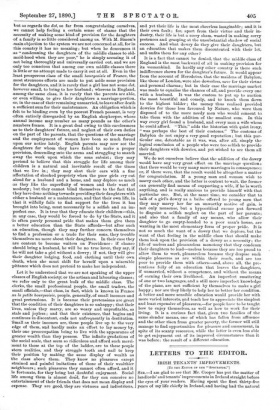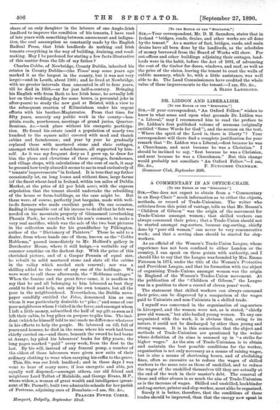LETTERS TO THE EDITOR.
IRISH TENANTS' IMPROVEMENTS.
[To THE EDITOR 011 TIER " SPICCTATOR.1 SIE,—I am glad to see that Mr. Cooper has put the matter of landlords' and tenants' improvements in Ireland straight before the eyes of your readers. Having spent the first thirty-five years of my life chiefly in Ireland, and having had the natural
share of an only daughter in the labours of one Anglo-Irish landlord to improve the condition of his tenants, I have read of late years with something between amusement and indigna- tion, the cool assumption so constantly made by the English Radical Press, that Irish landlords do nothing and Irish tenants everything in the way of building, draining, and road- making. May I be pardoned for stating a few facts illustrative of this matter from the life of my father ?
Charles Cobbe, of Newbridge, County Dublin, inherited his estates in County Dublin—(the Times' map some years ago marked it as the largest in the county, but it was not very large)—and in Louth, about 1806; and he lived at Newbridge, with no greater intervals than amounted in all to four years, till he died in 1858,—or for just half-a-century. Bringing his English wife from Bath to her Irish home, he actually left her on their wedding-day for some hours, (a perennial joke in after-years) to study the new gaol at Bristol, with a view to the subsequent erection of Kilmainham under his urgent efforts with his brother-Magistrates. From that time, for fifty years, scarcely any public work in the county—hos- pitals, roads, poorhouses, meetings of grand juries, Quarter- Sessions, &c.—took place without his energetic participa- tion. He found his estate (amid a population of nearly two hundred to the square mile) covered with mud and thatch cabins and farmhouses ; and year by year he gradually replaced these with mortared stone and slate cottages, amongst which were five school-houses, all supported by him- self. As it was my frequent duty as I grew up, to draw for him the plans and elevations of these cottages, farmhouses, and village shops, with calculations of the cost of each, it may be guessed how truly absurd it seems to me to read exclusively of "tenants' improvements "in Ireland. It is true that my father occasionally let, on long leases and without fines, large farms (of the finest wheat-land in Ireland, within ten miles of Dublin Market, at the price of £2 per Irish acre), with the express stipulation that the tenant should undertake the rebuilding of the house or farm-buildings, as the case might be. But these were, of course, perfectly just bargains, made with well- to-do farmers who made excellent profit. On one occasion, finding it impossible out of his income to do all that he felt was needed on his mountain property of Glenasmoil (overlooking Phoenix Park), he resolved, with his son's consent, to make a very real sacrifice, which was the sale of the two best pictures in the collection made for his grandfather by Pilkington, author of the "Dictionary of Painters." These he sold to a dealer, from whose hands one of them, known as the " Cobbe Hobbema," passed immediately to Mr. Holford's gallery in Dorchester House, where it still haiigs,—a veritable ray of summer sunshine on the darkest day. With the price of this cherished picture, and of a Gaspar Poussin of equal size, he rebuilt in solid mortared stone and slate all the cabins in the valley which needed such renewal; nor was a shilling added to the rent of any one of the holdings. We were wont to call these afterwards, the " Hobbema cottages." When the famine and the great fever came, it is needless to say that he and all belonging to him laboured as best they could to feed and help, not only his own tenants, but all the poor in the neighbourhood. Nevertheless, the Dublin news- paper candidly entitled the Felon, denounced him as one whom it was particularly desirable to "pike ;" and some of our poor neighbours whom I visited in the fever, and amongst whom I left a little money, subscribed the half of my gift as soon as I left their cabin, to buy pikes on purpose to pike him. The inci- dent (which he himself told to me) made no difference whatever in his efforts to help the people. He laboured on till, full of years and honour, he died in the room where his work had been chiefly carried on,—and there, beneath the sword he had borne at Assaye, lay piled his labourers' books for fifty years; the long pages marked " paid " every week, from the first to the last. By his will, instead of any funeral pomp, a number of the oldest of those labourers were given new suits of their ordinary clothing to wear when carrying his coffin to the grave.
This, Sir, was one Irish landlord ; and in those days I was wont to hear of many more, if less energetic and able, yet equally well disposed,—amongst others, our old friend and neighbour Lord Talbot of Malahide, and George Evans, M.P., whose widow, a woman of great wealth and intelligence (great- aunt of Mr. Parnell), built two admirable schools for her parish of Portrane, adjoining ours of Donabate.—I am, Sir, &c.,
FRANCES POWER COBBE.
Ifengwrt, Dolgelly, September 22nd.



































 Previous page
Previous page